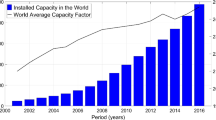Abstract
In wind energy systems, reliability analysis plays a significant role in increasing the lifetime of wind turbines. Moreover, improving the reliability of wind turbines minimizes the maintenance cost of the energy systems. Reliability refers to the probability that the wind turbine continues to attain its projected function without failure under operational conditions. In recent times, wind energy installation is increasing rapidly to meet the demand for pollution-free energy. However, the problems in wind energy systems like uncertainty, reliability issues, etc., need to be addressed to improve the performance. An analysis of wind energy system reliability is conducted using the Monte Carlo simulation technique. An estimate of the wind farm's performance is achieved by establishing a resistance-load relationship. Furthermore, the Weibull probability and cumulative distribution function were used to estimate the performance of the system. The simulation results illustrate that when the number of trials increases the probability of failure and error reduces.
Access this chapter
Tax calculation will be finalised at checkout
Purchases are for personal use only
Similar content being viewed by others
References
Nazir, M.S.: Environmental impact and pollution-related challenges of renewable wind energy paradigm—a review. Sci. Total Environ. 683, 436–444 (2019)
Behera, B.K.: eEnergy Security. Bioenergy for Sustainability and Security, pp. 1–77 (2019)
Mukherjee, A.: iGridEdgeDrone: hybrid mobility aware intelligent load forecasting by edge enabled Internet of Drone Things for smart grid networks. Int. J. Parallel Prog. 49, 285–325 (2021)
Chatterjee, A.: Wind-PV based generation with smart control suitable for grid-isolated critical loads in Onshore, India. J. Inst. Eng. India Ser. B 1–11 (2022)
Yang, L.: A continual learning-based framework for developing a single wind turbine cybertwin adaptively serving multiple modeling tasks. IEEE Trans. Ind. Inf. 18, 4912–4921 (2021)
Javed, M.S.: Solar and wind power generation systems with pumped hydro storage: review and future perspectives. Renew. Energ. 148, 176–192 (2020)
Abud, T.P.: State of the art Monte Carlo method applied to power system analysis with distributed generation. Energies 16, 394 (2023)
Shezan, S.A.: Effective dispatch strategies assortment according to the effect of the operation for an islanded hybrid microgrid. Energ. Convers. Manage. X 14, 100192 (2022)
Krupenev, D., Boyarkin, D., Iakubovskii, D.: Improvement in the computational efficiency of a technique for assessing the reliability of electric power systems based on the Monte Carlo method. Reliab. Eng. Syst. Saf. 204, 107171 (2020)
Kannan, P.: Evaluating prolonged corrosion inhibition performance of benzyltributylammonium tetrachloroaluminate ionic liquid using electrochemical analysis and Monte Carlo simulation. J. Mol. Liq. 297, 111855 (2020)
Author information
Authors and Affiliations
Corresponding author
Editor information
Editors and Affiliations
Rights and permissions
Copyright information
© 2023 The Author(s), under exclusive license to Springer Nature Singapore Pte Ltd.
About this paper
Cite this paper
Jasmine Gnana Malar, A., Ganga, M., Parimala, V., Chellam, S. (2023). Estimation of Wind Energy Reliability Using Modeling and Simulation Method. In: Bhateja, V., Carroll, F., Tavares, J.M.R.S., Sengar, S.S., Peer, P. (eds) Intelligent Data Engineering and Analytics. FICTA 2023. Smart Innovation, Systems and Technologies, vol 371. Springer, Singapore. https://doi.org/10.1007/978-981-99-6706-3_40
Download citation
DOI: https://doi.org/10.1007/978-981-99-6706-3_40
Published:
Publisher Name: Springer, Singapore
Print ISBN: 978-981-99-6705-6
Online ISBN: 978-981-99-6706-3
eBook Packages: Intelligent Technologies and RoboticsIntelligent Technologies and Robotics (R0)




